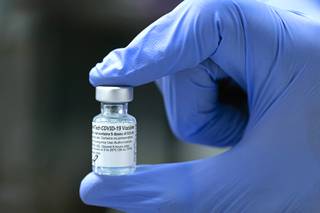Related Content
Government and nonprofit health and community services organizations are expanding their COVID-19 educational campaigns about the newly released vaccines not just in English and Spanish, but soon, Thai and Vietnamese, Korean and Chinese.
“Just duplicating it and translating it into another language is not enough,” said Erika Marquez, a UNLV public health professor and coalition vice chair. “We had to engage these communities in the conversation, and that takes some time.”
Since the two COVID-19 vaccines approved for use in the United States arrived in Nevada hospitals this month, the Southern Nevada health district has posted the tiered priority access list in English and Spanish. The health district also partners on the local Esta En Tus Manos (“It’s In Your Hands”) initiative to reach Spanish speakers.
A spokeswoman for Immunize Nevada said the Reno-based group had released vaccine promotional materials in English and Spanish and developed radio and television spots in both languages, and is working on messages in other languages.
In the Las Vegas area, Dr. Fermin Leguen, the health district’s acting chief health officer, provides remarks in Spanish to Spanish-language outlets. PHLV, a radio station for Vegas’ sizable Filipino diaspora, has highlighted the vaccines on its health-related programming.
PHLV host Marife Aczon-Armstrong, a nursing professor at Roseman University of Health Sciences and founding president of the Asian American Pacific Islander Nurses Association of Nevada, invited Roseman colleague and immunologist Manas Mandal to join her on the air earlier this month to explain — in English — how the vaccine works. As a guest on another PHLV show with the Asian Community Development Council, Aczon-Armstrong related, and encouraged more of, a welcoming Filipino perspective on vaccination.
She said as a child in the Philippines, she lined up with other pupils to get shots at school, injected in the upper arm. Filipino-Americans will connect when they see each others’ telltale scars and ask if they received their bakunas in the Philippines.
“I think in our minds, we trust the people who are giving us the vaccination,” she said. “It’s supposed to be good for us.”
Marquez’s team at the Nevada Minority Health & Equity Coalition launched the One Community campaign earlier in the COVID-19 pandemic to encourage physical distancing, hand hygiene and masks. The group is now finalizing its vaccination materials in English and Spanish, and beginning the same work in Vietnamese, Korean, Chinese and Thai.
In a couple of weeks, it will release short videos featuring trusted local community leaders among the groups the coalition advocates for — the coalition engages with several partners to develop culturally relevant information for Black, Latino, Native American, Asian and Pacific Islander communities, along with LGBTQ and deaf and hard-of-hearing people, in English and heritage languages.
According to Southern Nevada health district statistics, COVID-19 infection is highest in ZIP codes in North Las Vegas and eastern Las Vegas. One of the hot spots, the 89030 swath of North Las Vegas, has a population that is 70% Latino, according to U.S. Census data. In another, the 89110 ZIP code, the population is 64% Latino, and only 40% of households solely speak English.
JoAnn Rupiper, the health district’s director of clinical services, suggested at a news conference this past week that future mass vaccination events could target geographic areas where infection was more prevalent, citing a successful targeted response to a recent Hepatitis A outbreak.
The federal Centers for Disease Control and Prevention took some media scrutiny over initially making vaccine information, including a postvaccine health tracker app, in English only.
Marquez said such criticism would not be fair now. Experts are still developing the structure of their messages after being kicked into high gear over the past few weeks, nearly a year into absorbing fast-moving updates and doing outreach in real time. Tailoring messages will be an ongoing effort, at least for the Nevada Minority Health and Equity Coalition.
More advanced questions from its focus groups — like the makeup of vaccine trial groups — will require reviews of research to answer.
Groups like hers have to make the science digestible, relatable and accurate, Marquez said.
“Our end goal here is to protect everyone in our community, and in order to do that and to make sure we address any of their concerns, it has to be multicultural and multilingual,” she said.


